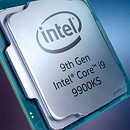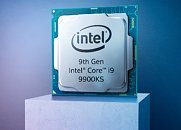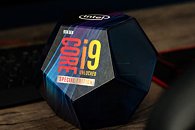Monday, October 28th 2019

Intel Announces Core i9-9900KS, World's Best Processor for Gaming Made Better
Intel today announced full details and availability for the new 9th Gen Intel Core i9-9900KS Special Edition processor. Delivering up to 5.00 GHz all-core turbo frequency out of the box for the ultimate gaming experience, the 9th Gen Intel Core i9-9900KS will be available beginning Oct. 30, with recommended customer price starting at $513. This special edition processor will be available for a limited time only and can be found at retailers worldwide.
"Intel has raised the bar for desktop gaming with the new 9th Gen Intel Core i9-9900KS Special Edition processor. Based on the 9th Gen Intel Core i9-9900K architecture, it's the world's best gaming desktop processor made even better and created specifically for extreme gamers who want the most performance possible. This processor demonstrates another innovation milestone for Intel, following last year's limited edition 8th Gen Intel Core i7-8086K," said Frank Soqui, Intel vice president and general manager of the Desktop, Workstation and Channel Group. The i9-9900KS processor is unlocked and boasts eight cores and 16 threads, up to 4.00 GHz base frequency, 127 W TDP, 16 MB Intel Smart Cache, and up to 40 platform PCIe lanes for gaming and overclocking.Key Features and Capabilities:
Performance results are based on testing as of August 10, 2019 and may not reflect all publicly available security updates. See configuration disclosure for details. No product can be absolutely secure. Software and workloads used in performance tests may have been optimized for performance only on Intel microprocessors. Performance tests, such as SYSmark and MobileMark, are measured using specific computer systems, components, software, operations and functions. Any change to any of those factors may cause the results to vary. You should consult other information and performance tests to assist you in fully evaluating your contemplated purchases, including the performance of that product when combined with other products. For more complete information about performance and benchmark results, visit http://www.intel.com/benchmarks.
As measured by in-game benchmark mode performance (score or frames per second) where available, or frames per second where benchmark mode is unavailable. PC Gaming Processors Compared: 9th Gen Intel Core i9-9900KS, 9th Gen Intel Core i9-9900K, Intel Core i9-9980XE Extreme Edition, Intel Core i9-9960X X-series, Intel Core i9-9940X X-series, AMD Ryzen 9 3900X, AMD Ryzen 7 3800X, AMD Ryzen 7 3700X, AMD Ryzen 5 3600X, and AMD Ryzen 7 2700X. Prices of compared products may differ. Configurations: Graphics: Nvidia GeForce RTX 2080 Ti, Memory: 2x8GB DDR4 or 4x4GB DDR4 (2666, 2933 or 3200 per highest speed of the corresponding processor), Storage: Intel Optane SSD 900P, OS Windows 10 Pro 1903 v175 19H1(RS6). Results: 9th Gen Intel Core i9-9900KS scored better on the majority of the 20+ game titles tested.Intel Core i9-9900KS is a special edition of Intel Core i9-9900K, with even better performance.
1Altering clock frequency or voltage may damage or reduce the useful life of the processor and other system components, and may reduce system stability and performance. Product warranties may not apply if the processor is operated beyond its specifications. Check with the manufacturers of system and components for additional details.
2As measured by gameplay FPS on PUBG (Season 4 - "PC Update 4.1") - 1080p High Settings comparing 9th Gen Intel Core i9-9900KS vs. 6th Gen Intel Core i7-6700K. Measured on platforms with Intel Core i9-9900KS Processor, PL1=127W TDP, 8C16T, Turbo up to 5.0GHz, Motherboard: MSI Z390 A Pro, Graphics: NVIDIA GTX 2080Ti, Gfx version: 430.86, Memory: 2x8GB DDR4 2666, Storage: 480GB Intel Optane SSD 900P, OS: Windows* 10 Pro 1903 v175 19H1(RS6), BIOS Version 1105 vs. Intel Core i7-6700K Processor, PL1=95W TDP, 4C8T, Turbo up to 4.2GHz, Motherboard: MSI Z170MPLUS A Pro, Graphics: NVIDIA GTX 2080Ti, Gfx version: 430.86, Memory: 4x4GB DDR4 2133, Storage: 480GB Intel Optane SSD 900P, OS: Windows* 10 Pro 1903 v175 19H1(RS6), BIOS Version 3805
3As measured by gameplay FPS on Total War: 3 Kingdoms - Campaign - 1080p High Settings comparing 9th Gen Intel Core i9-9900KS vs. 6th Gen Intel Core i7-6700K. Measured on platforms with: Intel Core i9-9900KS Processor, PL1=127W TDP, 8C16T, Turbo up to 5.0GHz, Motherboard: MSI Z390 A Pro, Graphics: NVIDIA GTX 2080Ti, Gfx version: 430.86, Memory: 2x8GB DDR4 2666, Storage: 480GB Intel Optane SSD 900P, OS: Windows* 10 Pro 1903 v175 19H1(RS6), BIOS Version 1105 vs. Intel Core i7-6700K Processor, PL1=95W TDP, 4C8T, Turbo up to 4.2GHz, Motherboard: MSI Z170MPLUS A Pro, Graphics: NVIDIA GTX 2080Ti, Gfx version: 430.86, Memory: 4x4GB DDR4 2133, Storage: 480GB Intel Optane SSD 900P, OS: Windows* 10 Pro 1903 v175 19H1(RS6), BIOS Version 3805
4As measured by Adobe Premiere Pro CC Transcode4Kvideo SW workload comparing 9th Gen Intel Core i9-9900KS vs. Intel Core i7-8700K. Measured on platforms with: Intel Core i9-9900KS Processor, PL1=127W TDP, 8C16T, Turbo up to 5.0GHz, Motherboard: MSI Z390 A Pro, Graphics: NVIDIA GTX 2080Ti, Gfx version: 430.86, Memory: 2x8GB DDR4 2666, Storage: 480GB Intel Optane SSD 900P, OS: Windows* 10 Pro 1903 v175 19H1(RS6), BIOS Version 1105 vs. Intel Core i7-8700K Processor, PL1=95W TDP, 6C12T, Turbo up to 4.7GHz, Motherboard: MSI Z390 A Pro, Graphics: NVIDIA GTX 2080Ti, Gfx version: 430.86, Memory: 2x8GB DDR4 2666, Storage: 480GB Intel Optane SSD 900P, OS: Windows* 10 Pro 1903 v175 19H1(RS6), BIOS Version 1105
5As measured by Adobe Premiere Pro CC Transcode4Kvideo SW workload comparing 9th Gen Intel Core i9-9900KS vs. 6th Gen Intel Core i7-6700K. Measured on platforms with: Intel Core i9-9900KS Processor, PL1=127W TDP, 8C16T, Turbo up to 5.0GHz, Motherboard: MSI Z390 A Pro, Graphics: NVIDIA GTX 2080Ti, Gfx version: 430.86, Memory: 2x8GB DDR4 2666, Storage: 480GB Intel Optane SSD 900P, OS: Windows* 10 Pro 1903 v175 19H1(RS6), BIOS Version 1105 vs. Intel Core i7-6700K Processor, PL1=95W TDP, 4C8T, Turbo up to 4.2GHz, Motherboard: MSI Z170MPLUS A Pro, Graphics: NVIDIA GTX 2080Ti, Gfx version: 430.86, Memory: 4x4GB DDR4 2133, Storage: 480GB Intel Optane SSD 900P, OS: Windows* 10 Pro 1903 v175 19H1(RS6), BIOS Version 3805
6Intel is providing a one-year warranty on both the box and tray versions of this processor due to its limited volume.
The Recommended Customer Price ("RCP") is pricing guidance for Intel products. Prices are for direct Intel customers and are subject to change without notice. Taxes and shipping, etc. not included. Prices may vary for other package types and shipment quantities, and special promotional arrangements may apply. Listing of these RCP does not constitute a formal pricing offer from Intel. Please work with your appropriate Intel representative to obtain a formal price quotation. Purchases of Intel products are subject to Intel's Standard Terms and Conditions of Sale.
"Intel has raised the bar for desktop gaming with the new 9th Gen Intel Core i9-9900KS Special Edition processor. Based on the 9th Gen Intel Core i9-9900K architecture, it's the world's best gaming desktop processor made even better and created specifically for extreme gamers who want the most performance possible. This processor demonstrates another innovation milestone for Intel, following last year's limited edition 8th Gen Intel Core i7-8086K," said Frank Soqui, Intel vice president and general manager of the Desktop, Workstation and Channel Group. The i9-9900KS processor is unlocked and boasts eight cores and 16 threads, up to 4.00 GHz base frequency, 127 W TDP, 16 MB Intel Smart Cache, and up to 40 platform PCIe lanes for gaming and overclocking.Key Features and Capabilities:
- Up to 5.00 GHz all-core turbo frequency; up to 4.00 GHz base frequency, which allow games to run faster when they scale across more cores for higher frame rates
- Eight cores, 16 threads, 127 W TDP, 16 MB Intel Smart Cache, and up to 40 platform PCIe lanes
- Compatible with existing Z390 motherboards
- Up to 27% faster mega-tasking when you simultaneously game, stream and record compared with a 3-year-old PC
- Up to 35% more frames per second compared with a 3-year-old PC
- Up to 17% faster 4K video editing compared with the previous generation and up to 78% faster compared with a 3-year-old PC
- One-year warranty
- Overclock confidently with new and enhanced features like Intel Performance Maximizer, which makes it easy to dynamically and reliably custom-tune the unlocked processor based on the processor's individual performance DNA
Performance results are based on testing as of August 10, 2019 and may not reflect all publicly available security updates. See configuration disclosure for details. No product can be absolutely secure. Software and workloads used in performance tests may have been optimized for performance only on Intel microprocessors. Performance tests, such as SYSmark and MobileMark, are measured using specific computer systems, components, software, operations and functions. Any change to any of those factors may cause the results to vary. You should consult other information and performance tests to assist you in fully evaluating your contemplated purchases, including the performance of that product when combined with other products. For more complete information about performance and benchmark results, visit http://www.intel.com/benchmarks.
As measured by in-game benchmark mode performance (score or frames per second) where available, or frames per second where benchmark mode is unavailable. PC Gaming Processors Compared: 9th Gen Intel Core i9-9900KS, 9th Gen Intel Core i9-9900K, Intel Core i9-9980XE Extreme Edition, Intel Core i9-9960X X-series, Intel Core i9-9940X X-series, AMD Ryzen 9 3900X, AMD Ryzen 7 3800X, AMD Ryzen 7 3700X, AMD Ryzen 5 3600X, and AMD Ryzen 7 2700X. Prices of compared products may differ. Configurations: Graphics: Nvidia GeForce RTX 2080 Ti, Memory: 2x8GB DDR4 or 4x4GB DDR4 (2666, 2933 or 3200 per highest speed of the corresponding processor), Storage: Intel Optane SSD 900P, OS Windows 10 Pro 1903 v175 19H1(RS6). Results: 9th Gen Intel Core i9-9900KS scored better on the majority of the 20+ game titles tested.Intel Core i9-9900KS is a special edition of Intel Core i9-9900K, with even better performance.
1Altering clock frequency or voltage may damage or reduce the useful life of the processor and other system components, and may reduce system stability and performance. Product warranties may not apply if the processor is operated beyond its specifications. Check with the manufacturers of system and components for additional details.
2As measured by gameplay FPS on PUBG (Season 4 - "PC Update 4.1") - 1080p High Settings comparing 9th Gen Intel Core i9-9900KS vs. 6th Gen Intel Core i7-6700K. Measured on platforms with Intel Core i9-9900KS Processor, PL1=127W TDP, 8C16T, Turbo up to 5.0GHz, Motherboard: MSI Z390 A Pro, Graphics: NVIDIA GTX 2080Ti, Gfx version: 430.86, Memory: 2x8GB DDR4 2666, Storage: 480GB Intel Optane SSD 900P, OS: Windows* 10 Pro 1903 v175 19H1(RS6), BIOS Version 1105 vs. Intel Core i7-6700K Processor, PL1=95W TDP, 4C8T, Turbo up to 4.2GHz, Motherboard: MSI Z170MPLUS A Pro, Graphics: NVIDIA GTX 2080Ti, Gfx version: 430.86, Memory: 4x4GB DDR4 2133, Storage: 480GB Intel Optane SSD 900P, OS: Windows* 10 Pro 1903 v175 19H1(RS6), BIOS Version 3805
3As measured by gameplay FPS on Total War: 3 Kingdoms - Campaign - 1080p High Settings comparing 9th Gen Intel Core i9-9900KS vs. 6th Gen Intel Core i7-6700K. Measured on platforms with: Intel Core i9-9900KS Processor, PL1=127W TDP, 8C16T, Turbo up to 5.0GHz, Motherboard: MSI Z390 A Pro, Graphics: NVIDIA GTX 2080Ti, Gfx version: 430.86, Memory: 2x8GB DDR4 2666, Storage: 480GB Intel Optane SSD 900P, OS: Windows* 10 Pro 1903 v175 19H1(RS6), BIOS Version 1105 vs. Intel Core i7-6700K Processor, PL1=95W TDP, 4C8T, Turbo up to 4.2GHz, Motherboard: MSI Z170MPLUS A Pro, Graphics: NVIDIA GTX 2080Ti, Gfx version: 430.86, Memory: 4x4GB DDR4 2133, Storage: 480GB Intel Optane SSD 900P, OS: Windows* 10 Pro 1903 v175 19H1(RS6), BIOS Version 3805
4As measured by Adobe Premiere Pro CC Transcode4Kvideo SW workload comparing 9th Gen Intel Core i9-9900KS vs. Intel Core i7-8700K. Measured on platforms with: Intel Core i9-9900KS Processor, PL1=127W TDP, 8C16T, Turbo up to 5.0GHz, Motherboard: MSI Z390 A Pro, Graphics: NVIDIA GTX 2080Ti, Gfx version: 430.86, Memory: 2x8GB DDR4 2666, Storage: 480GB Intel Optane SSD 900P, OS: Windows* 10 Pro 1903 v175 19H1(RS6), BIOS Version 1105 vs. Intel Core i7-8700K Processor, PL1=95W TDP, 6C12T, Turbo up to 4.7GHz, Motherboard: MSI Z390 A Pro, Graphics: NVIDIA GTX 2080Ti, Gfx version: 430.86, Memory: 2x8GB DDR4 2666, Storage: 480GB Intel Optane SSD 900P, OS: Windows* 10 Pro 1903 v175 19H1(RS6), BIOS Version 1105
5As measured by Adobe Premiere Pro CC Transcode4Kvideo SW workload comparing 9th Gen Intel Core i9-9900KS vs. 6th Gen Intel Core i7-6700K. Measured on platforms with: Intel Core i9-9900KS Processor, PL1=127W TDP, 8C16T, Turbo up to 5.0GHz, Motherboard: MSI Z390 A Pro, Graphics: NVIDIA GTX 2080Ti, Gfx version: 430.86, Memory: 2x8GB DDR4 2666, Storage: 480GB Intel Optane SSD 900P, OS: Windows* 10 Pro 1903 v175 19H1(RS6), BIOS Version 1105 vs. Intel Core i7-6700K Processor, PL1=95W TDP, 4C8T, Turbo up to 4.2GHz, Motherboard: MSI Z170MPLUS A Pro, Graphics: NVIDIA GTX 2080Ti, Gfx version: 430.86, Memory: 4x4GB DDR4 2133, Storage: 480GB Intel Optane SSD 900P, OS: Windows* 10 Pro 1903 v175 19H1(RS6), BIOS Version 3805
6Intel is providing a one-year warranty on both the box and tray versions of this processor due to its limited volume.
The Recommended Customer Price ("RCP") is pricing guidance for Intel products. Prices are for direct Intel customers and are subject to change without notice. Taxes and shipping, etc. not included. Prices may vary for other package types and shipment quantities, and special promotional arrangements may apply. Listing of these RCP does not constitute a formal pricing offer from Intel. Please work with your appropriate Intel representative to obtain a formal price quotation. Purchases of Intel products are subject to Intel's Standard Terms and Conditions of Sale.



130 Comments on Intel Announces Core i9-9900KS, World's Best Processor for Gaming Made Better
AMD doesn't cover overclocking either AFAIK.
www.techspot.com/review/1936-intel-core-i9-9900ks/
System Power Consumption:
No difference from the 9900K when overclocking the 9900KS
The only reason why Intel include IGP for the K-models is they use the same dies for OEM focused models, where IGP is a huge selling point.
I hope Intel in the future makes slightly different dies optimized for the custom builders (K-models) with no IGP, perhaps some cache tweaks etc. or something that is better use of that die space. It's such a waste when 99% of the buyers will never use that IGP…
IGP is popular among gamers who have a 2nd screen for browser, utilities, game data, etc
From what I've seen monitors hooked up to different GPUs can cause some serious stutter.
It's been years since amd or Intel touted that technology.
Isn't that weird?Maybe not so different but the power consumption is up a fair bit and shorter warranty. That is a bummer considering these chips are to be maxed out or exceed specs noticeably. I guess, they are taking some precautions for broken chips.
I don't know where this "4x binning" comes from, it makes no sense.
i am assuming that lesser chips all come from failed 9900 chips.. or with good yields deliberately crippled chips to meet market demand..
i bought a 9900k chip a while back before all the good or better ones went into the KS bin.. my chip is running 5 g at 1.24 volts i recon my thinking panned out.. but at 1.35 or so to get 5 g i still dont see how they are keeping the KS chip cool enough..
trog
Maybe when evaluation of the 9900K is done and there are chips in that bin they evaluate them again to see if they can do better than what 9900K spec says and they end-up as better quality products?
That kinda explains the KS CPU.
Anyway it seems like Intel has made a market product out of higher quality product than their previous purpose.
For starters, you'd need to overpower the game in terms of GPU, for even see any difference.
For which TPU ended up running 720p game tests with overprice piece of crap like 2080Ti.
And then, YMMV, lol:
But hey, at least you pulled your shit together here and got the right information/graph (though clearly cherry picked for your fanboy purpose)...unlike here.
So tired of the polarizing BULLSHIT at this website and nothing being done about it.
CPUs like i9-9900K, i7-9700K, i7-9600K and i7-8700K are already faster than needed for current games and GPUs, bumping the clock more wouldn't do much except for a handful of edge cases. All of these will probably be plenty fast for gaming for several years.
Mankind moving forward. (if only by a little bit) :)